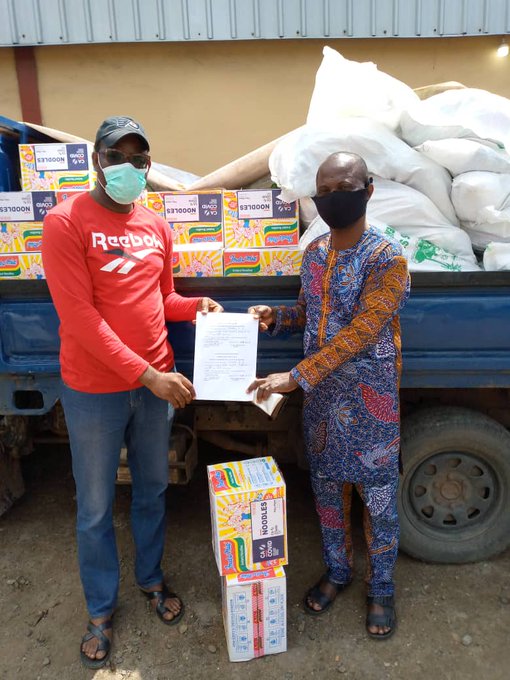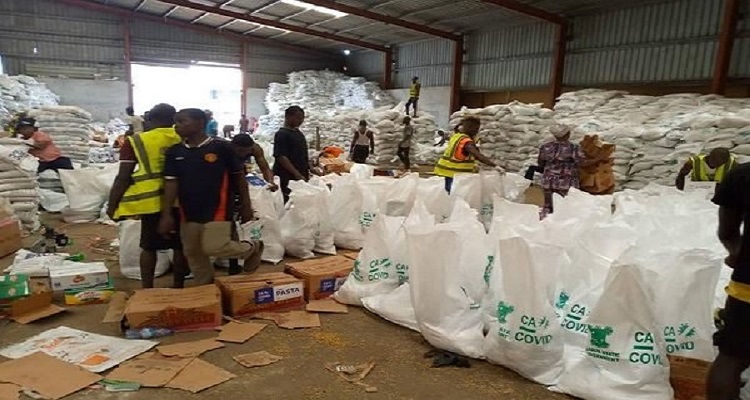The Lagos State government warehouse for palliatives donated by Coalition Against COVID-19 (CACOVID) at Maza-Maza community in Amuwo Odofin was looted by Lagos residents.
The looters carted away food items like bags of rice, cartons of noodles, garri, pasta, tomatoes, sugar and salt with “CACOVID NOT FOR SALE” boldly inscribed on them.


Looting and Unrest
Taking advantage of the unrest sparked by the shooting of #ENDSars protesters at Lekki Toll Gate, hundreds of locals stormed the warehouse that housed the COVID-19 palliatives and carted away the food items on Thursday.
According to reports, the locals forced their way into the warehouse after some officials refused to hand over some of the food items after begging them.
Video report showed the ensuing ruckus as residents rushed into the warehouse to cart away with food items. Some of the resident who made videos of the incident described it as taking what is theirs as the government was hoarding it.
“The same people the palliatives are meant for, are the same people that looted it. Why didn’t the government share it when they received it? Why wait till October? Don’t they know people are hungry?”
Lagos Resident
Many people on social media also agreed with this notion, questioning why the government would keep so much food locked up when people were hungry.
Lagos Govt Denies hoarding Palliatives
The Lagos State government, through its Ministry of Agriculture official Twitter handle, has however denied hoarding the palliatives. It explained that the governor had on September 22, 2020, received the food palliatives from the CACOVID team.
“The State Governor, Mr Babajide Sanwo-Olu had on September 22, 2020, formally taken receipt of the food palliatives from the CACOVID team meant for distribution to the indigent.”
It added that the palliatives were being re-bagged and distribution was already ongoing but was halted due to protest.
Suggested read: COVID-19 Update: Lagos Reopens Cinemas and Gyms, FG Sets Up Vaccine Company
Were the palliatives hoarded?
Although the government has come out to dispel rumours that it hoarded COVID-19 palliatives, several discrepancies sheds doubt on the claim.
First of all, there is unconfirmed video evidence of the warehouse being stocked as early as May as opposed to the September 22 the goverment claims.
Recall that the brunt of the COVID-19 pandemic was during the lockdown which ended in May. Reasonably this would have been the best time to share palliatives to the many hungry Lagosian at the time.
Another is the fact that video evidence shows that some of the food items have been stocked for months. Some bags of garri showed coagulation which is common with the food item being improperly stored for an extended period of time.
That said, even if what the government claimed was true and the palliatives were received in September, their method of distribution may be flawed as many Lagosians appear to be in the dark about it.
Could Lagos govt have done better?
The large number of food items found at the warehouse and the picture evidence showing palliatives distribution show that just a few Lagosians have benefited from the palliatives in the last month.
With a poor population of over 2 million and a total population of over 21 million, Lagos has a huge amount of people in urgent need of these Covid-19 palliatives.
The government explained that it is using groups such as transport unions, ethnic groups, religious associations, artisans and tradesmen association, market men and women association, people living with disabilities, orphanages and old peoples’ homes for effective distribution of the food palliatives.


Local Government Database
Although the current method is workable, it can be slow and ultimately ineffective as there are more classes of people in Lagos who do not fall in these traditional categories.
There are alternatives where technology can be leveraged to better distribute Covid-19 palliatives especially in a state as populated as Lagos. For one a Local government database for identification of struggling households using income data would not only be helpful for distribution but several other purposes.
Bike delivery – Logistics
Apart from finding those who need the palliatives, fast delivery is also important as many families go hungry daily. Logistics through bike delivery is a proven way to get things to where they are needed urgently.
Therefore with a home address, palliatives could be delivered to the doors of thousand of Lagosian struggling to get by.
While some might argue that there is currently not enough delivery equipment (bikes) to take on such a task, a quick reminder will be the fact that Lagos government has grounded thousand of ride hailing bikes with its ban in February this year.
In a situation such as this, the availability of e-hailing bikes can make it possible for the government to complete sharing of the palliative in weeks.
In summary, the looting of the Covid-19 palliatives meant for everyone by a select few is quite unfortunate and certainly not in the best interest of everyone. But the Lagos State government could have done better in distribution.






